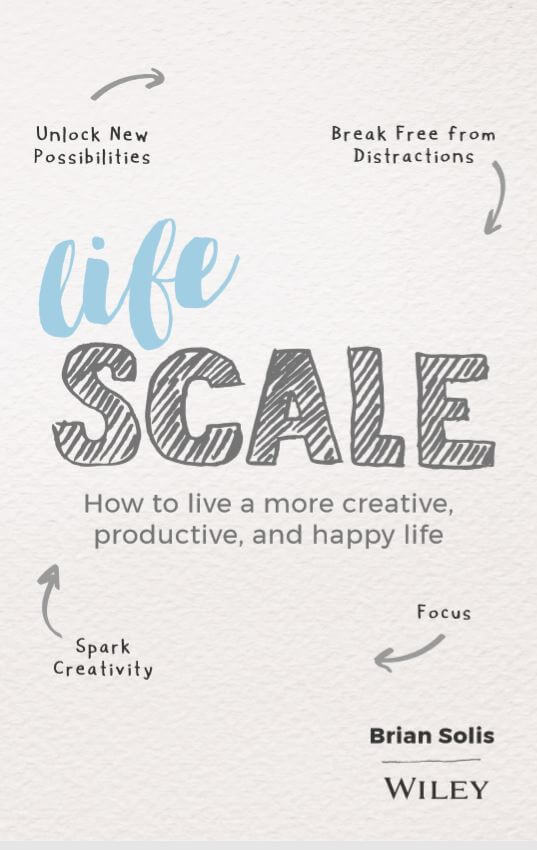In the 20 years since he founded his groundbreaking new media consulting firm Futureworks, Brian Solis has developed a rep in the tech world and beyond as one of the leading digital analysts of our time.
In addition to studying disruptive technology and its impact on business, he is also a digital anthropologist who has devoted his professional life to understanding how technology affects and shapes, behaviors, norms and society. The Silicon Valley based “godfather of social media” has shared his expertise via numerous bestselling books over the years. Yet he’s never written a volume as potentially impactful and culture-shifting as his latest, Lifescale: How to Live a More Creative, Productive and Happy Life.
What makes this volume so unique is that Brian abdicates his role as expert imparting hard-earned wisdom to become one with his readers, understanding that they, like he, are struggling to live peacefully and productively in a day-to-day world of constant digital distractions and addictions. He humbly realized that he had a big problem with all these issues, which were adversely affecting both his personal and professional relationships.
The model for “lifescaling” that he arrives at is aimed to help people overcome the unforeseen personal consequences of living a digital life, avoid constant diversions, focus on what’s important, spark new creativity and unlock new possibilities. The first words of the book let the reader know that he’s on the step by step journey with them: “As you read this, so you know what my state of mind was, I don’t know what the rest of the book was going to be. As you keep turning the pages, you will see me trying to figure it out.”
The Power of Positivity
Although one of the primary reasons he wrote Lifescale was to discover ways to overcome the constant distractions and addictions to our devices and social media, he dedicates an entire chapter (“Energize”) to what famed author Norman Vincent Peale once called “The Power of Positive Thinking.”
The chapter subhead, “Positivity Opens the Doors to Our Destinations” sums up Brian’s view that to find true joy and balance in our lives, we must believe in ourselves first – and our unique power to fulfill our dreams. He wrote: “It’s those whose dreams and imagination become so vivid on the inside that they influence the outside world around them and reshape their destiny and those whom they touch.” Solis quotes from the website for Martin Seligman’s Positive Psychology Program at the University of Pennsylvania. Some of the wide-ranging benefits of cultivating positivity listed by him, via the site are:
- Increased productivity
- Decreases burnout
- Leads to better assessments of us by our employers
- Increases creativity
- Improves our overall psychological well-being
Discipline & Positivity
The Lifescale mindset is one where both elements – avoiding distractions and a positive mindset – are crucial for managers in the business/corporate settings to create a productive workspace culture. These concepts complement several incredible productivity articles in Home Business Magazine: “How I Improved My Productivity up to 300%” and “A Friendly Workplace Increases Employee Productivity.”
Brian would like to share several empowering online resources where he found insights (in line with the themes of Lifescale) on ways to achieve both.
Let’s start with the “4 Easy Ways to Fight Distraction at Work and Perform Brilliantly,” a ProofHub Blog written by Sandeep Kashyap, CEO of SDP Labs.
His list:
- Stop multitasking. Do one thing at a time; always be present, finish before your start; concentrate on the most important tasks one at a time; and do not let small tasks interrupt larger ones.”
- Squash negative self-talk. Be conscious of what you are telling yourself. Think the opposite of the negative thought. Avoid negative people, compliment others and take care of yourself.
- Kick your email addiction. Choose specific times during your day to check. Turn off your alerts. Disconnect from your inbox and prioritize urgent matters.
- Keep yourself away from auditory distractions. Sometimes, background sounds can create stress that releases cortisol into the body. The excess cortisol affects the part of the brain which regulates the ability to plan and remember things. Find a quiet place to work. Use noise canceling headphones. If there is a door, shut it. Listen to some natural sounds.
As to the other point, Inc. Magazine created “7 Tips for Creating a Positive Workplace Culture.”
These include:
- Begin with gratitude.
- Create a safe environment, which includes eliminating negative personalities and respecting every idea, whether it’s from an intern of tenured team member.
- “Don’t leave your dirty dishes in the sink” – i.e., don’t leave a mess for someone else to clean. Time is our most valuable currency. When we aren’t respectful of our colleagues’ time, we are contributing to a negative workplace environment.
- Realize there are only opportunities in business, not problems. Every challenge is an opportunity to reflect, analyze and evaluate so that we will do better next time.
- Consistency is key.
- Encourage positive thinking. Setting weekly, monthly and yearly positive intentions as a group will help to align your team and ensure that everyone is facing towards the same North Star.
- Don’t sacrifice the important for the urgent. Dependability, structure, clarity and meaningful work are all ingredients that, when combined, can culminate in a solid foundation for a positive workplace.
Find a Home-Based Business to Start-Up >>> Hundreds of Business Listings.
















































